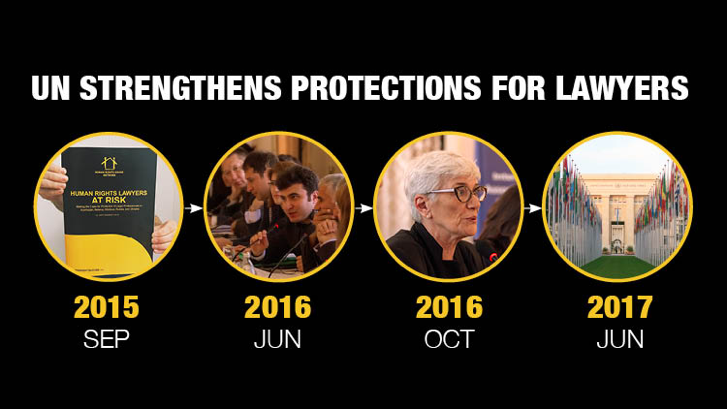“We have sadly witnessed a rise in intimidation, threats and reprisals against lawyers working on human rights and politically sensitive issues in recent years, including against our partners,” said Florian Irminger, Head of Advocacy at Human Rights House Foundation (HRHF).
“This resolution will help to protect them. States must implement and uphold the protections it establishes, and the international community must ensure that they do so,” he added.
The resolution condemns the increasingly frequent attacks on the independence of judges, lawyers, prosecutors and court officials and calls on States to take measures against this.
Further, it condemns acts of violence, intimidation and reprisals against judges, prosecutors and lawyers themselves, and reminds States of their duty to protect these persons and their families, by condemning such acts and bringing the perpetrators to justice.
By emphasising that lawyers should not be identified with their clients or their clients’ causes, the resolution addresses an issue at the heart of protecting lawyers working on human rights and other seemingly sensitive issues. It invites states to recognise the vital role played by lawyers in upholding the rule of law and promoting and protecting human rights.
Significantly, the resolution calls on States to provide human rights training for judges, prosecutors, and lawyers, and for this to take into account regional and international human rights law and the concluding observations and decisions of human rights mechanisms, such as treaty bodies and regional human rights courts.
“This call for States to directly include the concluding observations and decisions of human rights mechanisms in the training of the legal profession is significant, and it will strengthen the implementation of guarantees and immunities for lawyers,” commented Florian Irminger.
Earlier in the HRC session, HRHF highlighted three cases that were emblematic of the negative trends affecting the rights of human rights lawyers, in a statement during an interactive dialogue with the new Special Rapporteur on the independence of judges and lawyers, Diego García-Sayán.The cases include the ongoing restrictions on Intigam Aliyev in Azerbaijan, the interrogation and detention of Crimean Tatar and human rights lawyer Emil Kurbedinov, and the criminal charges against Veaceslav Turcan and Maxim Belinschi in Moldova.
During the dialogue, alongside announcing an official visit to Poland in October, the Special Rapporteur paid tribute to lawyers in “precarious positions” as they carried out their work, and argued that the international human rights framework was relied on by many for daily protection.
The adoption of the resolution by the HRC comes nearly two years after HRHF and partners from the Human Rights House ILIA Programme published the landmark report, Human Rights Lawyers at Risk. This highlighted the growing intimidation and persecution of human rights lawyers, and made the case for strengthening the protection they receive.

Later, in June 2016, HRHF and Human Rights House Belgrade organised consultations for lawyers and civil society to give input to the former Special Rapporteur Monica Pinto on 11 and 12 June in Belgrade. Her report, based on these recommendations, was presented to the UN General Assembly in October 2016. The resolution at the Human Rights Council takes note of this report.
The resolution was tabled by Hungary on behalf of a cross-regional group of countries, and was passed by consensus. Speaking shortly before the adoption of the resolution, the Hungarian delegation said that in the course of the negotiations on the text, those tabling the resolution had “received a number of comments from civil society… which were largely taken on board.” The delegation added that “lawyers should be able to carry out their work without fear of reprisals.”
During the Council session, HRHF advocated for the resolution’s strong language on reprisals, and it has long called for protection for lawyers against reprials for using international legal mechanisms, such as the UN Human Rights Committee or the European Court of Human Rights.
Documents:
- Guarantees and immunities for lawyers: HRHF’s statement at HRC35
At the 35 session of the UN Human Rights Council, HRHF calls for guarantees and immunities for lawyers to be enshrined in national and international law to be implemented and respected, and for human rights guarantees to extend to all who work within human rights, including human rights lawyers.
- HRHF briefing note on guarantees and immunities for lawyers, at HRC35
The international standards that are particularly relevant for lawyers working on human rights include: guarantees against disbarment as a sanction; protection as human rights defenders; representation at international bodies and freedom from travel bans; freedom of expression and association; non-discrimination and admission to the legal profession; and human rights education.
International Law in Advocacy (ILIA)
The Human Rights House programme “International Law in Advocacy” (ILIA) provides education in international human rights law, strategies on how to implement human rights standards at national level, and entry into an active, international alumni of human rights lawyers.
“States should respect and protect lawyers who promote and defend human rights defenders”
The report of the former UN Special Rapporteur on Judges and Lawyers, Monica Pinto, was presented to the UN General Assembly on 21 October 2016. The report gives clear recommendations on the actions States and bar associations should take to ensure the independence of lawyers.
Lawyers and civil society give input to Special Rapporteur
On 11–12 June, the former UN Special Rapporteur on the Independence of Judges and Lawyers, Mónica Pinto, met with and gained input from lawyers and civil society actors. Ahead of this consultation in Belgrade, members of Human Rights House Belgrade spoke to HRHF about the importance of the consultation and the benefits of a cross-border community of lawyers.





